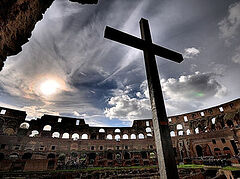It may be tempting to lay the manifold problems of modern society squarely on the shoulders of younger generations, as if they held a secret convention in which they agreed by popular vote to become total sociopaths. But those vices we often self-righteously ascribe to them—hedonism, narcissism, etc.—did not arise spontaneously, but were nurtured in them by their similarly (if somewhat less) corrupt forebears. The present era, in other words, is but the culmination of decades —one might say centuries—of gradual societal decay.
This is the proper lens through which we should view the “good ol’ days” of our formative years. Of course, it is understandable why many people from my generation look nostalgically upon the ‘80s and ‘90s. After all, it was a more wholesome time. But this, of course, is the same thing as saying that it was less unwholesome, and it is difficult to be motivated by the desire to return to an era that was (albeit to a lesser degree) unwholesome.
Therefore, the recent past and the present are causally linked in a historical chain that bears witness to the gradual deterioration of society. The pleasures of the former era have contributed, in their own manner, to the misery of the latter. For instance, popular culture in the 80s and ‘90s contributed to the process by which premarital sex was normalized (and, indeed, glorified). This naturally led to an increase in the numbers of unwanted pregnancies and single-parent households, resulting in many devastating social and economic consequences. Ignoring this causal link is somewhat like judging a gluttonous man’s diet as good or bad solely on the basis of the pleasure he derived from eating, and not also on the health problems he suffered partially as a result of the diet. Treating the two as though they were not causally related would result in a deeply misguided judgment of the man’s diet.
Now, if the recent past was so tainted, then it follows that the ideas and practices that arose or were nurtured during this period may be tainted, as well. Yet we have difficulty in drawing this conclusion since the past was a much happier time, and all the things reminiscent of it—the songs, the shows, the traditions, etc.—appear wholesome by association. They appear so partly because of their link to the past, and we understand—perhaps intuitively—that there was once a much purer past, even if we fail to date this period early enough. As a result, we tend to overlook the extent to which we have been malformed during our formative years. (This partly explains the ease with which modern ideas and practices have influenced believers and engendered in place of Christianity a syncretic faith that is all the more pernicious because it largely goes undetected.)
Take the example of music. One of my daughters recently remarked that some of the older songs I listen to are hardly more appropriate for children than the nihilistic noise that passes as music these days. I could not challenge her claim because she was absolutely right. But what about those ideas and practices that have shaped our personal identities or helped to form the moral bedrock of our society? I can easily enough alter my choice of music, but am I willing to endure the consequences of rejecting these more salient cultural attributes? Am I prepared for the identity crisis that will result from the realization that my personality has been built on lies? Am I willing to be ostracized for questioning the moral orthodoxy of the day?
I do not wish to give the impression that nostalgia is, in itself, bad. Many of us long for the past because we believe, correctly, that the past uniquely offered something that satisfied a core human need—namely, the need for hope for something better and everlasting beyond this life, which communities steeped in religious tradition, in which faith formed the center of one’s life and permeated every aspect of it, were able to inspire. In short, this past provided the means by which man’s spiritual thirst could be quenched. The tragedy of the present condition consists not only in the fact that we are dying of this thirst, but also of our ignorance of the reason for—or even the fact of—our condition, as well as the truth that the cure lies within our own hearts, buried though it is beneath layers of selfish and worldly attachments.
It seems, then, that our nostalgia is misplaced, but not intrinsically evil. The past in which we would feel most at home is far more distant than the ‘80s or ‘90s, and the more we cleanse ourselves from ideas and practices that we supposed were harmless or even wholesome, the further back in time our longing will take us. As a result of this process of “putting away the old man” (Eph 4:22), one cannot help but feel a profound sense of alienation from the world.
As painful as this feeling may be, it should have the salutary spiritual effect of reminding the Christian that his citizenship is not of this world (Phil 3:20), thus motivating him to expend every effort to transcend it. Otherwise, if he thought that he could settle for, if not fully delight in this world—if he did not feel as though he was a misfit, a refugee in his own country—then he might not apply as fervently, through heartfelt prayer, for citizenship in the other.
The lesson here is not that Christians should abandon the world. The solution, Ivan Ilyin1 maintained, is not “flight from this world, but the Christianization of the world” (p. 35). We should, indeed, strive to restore the conditions of our purer past, while remembering that the Kingdom of God is for this world, not of this world (Ilyin, cf. p. 35). As Ilyin rightly noted, the world “is a means for the spirit and for perfection” (p. 20) [emphasis added]. It is not here where our end is to be found, and at no other time than the present has this truth been clearer. Having no doubt, therefore, that we have nowhere in this world to lay our heads (cf. Matt. 8:20), let us turn more desperately to Christ, Who alone can show us the way to our true home.





